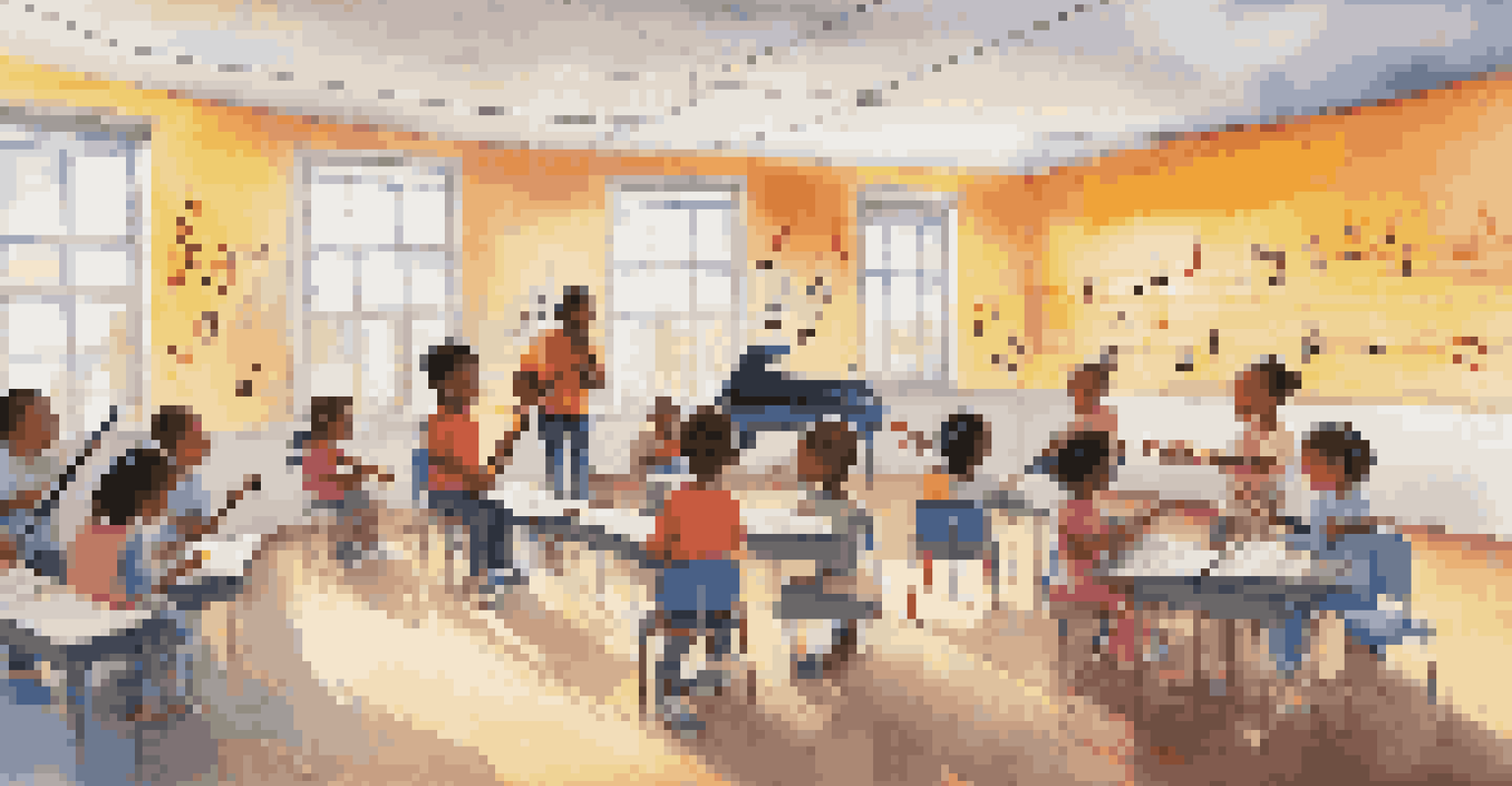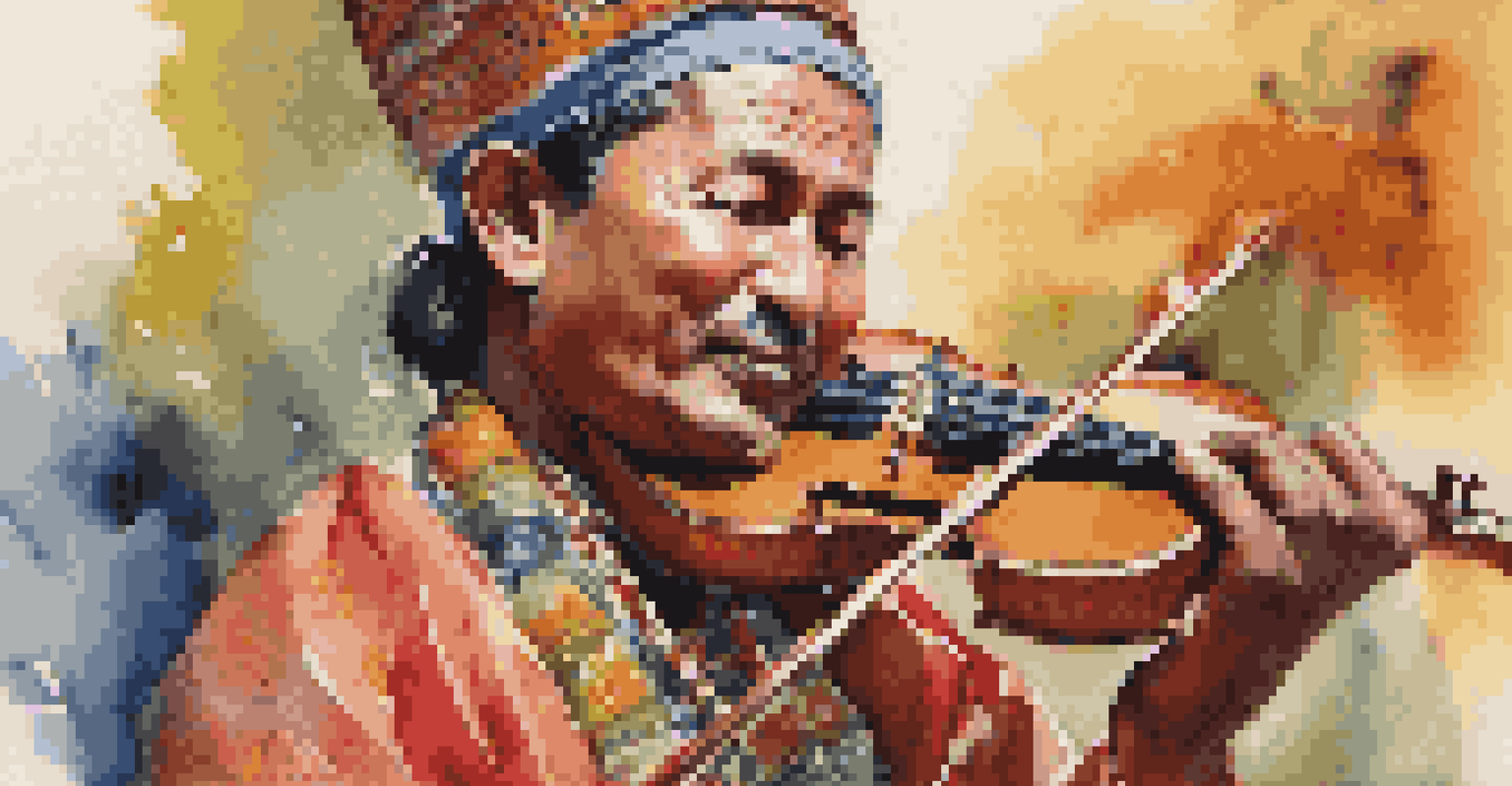The Role of Music in the Fight Against Global Poverty

Music as a Universal Language in Advocacy
Music transcends cultural and linguistic barriers, making it a powerful tool for advocacy. When artists use their platforms to address global poverty, they resonate with audiences who might otherwise feel disconnected from the issues. For instance, songs like 'We Are the World' brought attention to famine in Africa, demonstrating music's potential to unite people for a common cause.
Music can change the world because it can change people.
Through relatable lyrics and catchy melodies, musicians can effectively communicate messages about poverty, inspiring listeners to take action. This connection often leads to increased awareness and support for initiatives aimed at alleviating poverty. Furthermore, music can stimulate conversations about social justice, encouraging people to engage with these issues on a deeper level.
As a universal language, music fosters empathy and understanding, creating a shared space for dialogue. When people are moved by a song, they are more likely to learn about the realities of poverty and consider their roles in addressing it. This emotional connection can be a catalyst for change, driving community involvement and advocacy.
Fundraising Through Music Events and Festivals
Music events and festivals are not just entertainment; they often serve as fundraising powerhouses for poverty alleviation. Concerts and festivals can attract large crowds, generating significant revenue that can be directed towards charitable causes. For example, Live Aid in the 1980s raised millions for famine relief in Ethiopia, showcasing the potential of music to mobilize resources.

These events also provide a platform for artists to raise awareness about specific issues related to poverty. When fans attend a concert, they are not only enjoying music; they are also learning about the struggles faced by communities around the world. This combination of entertainment and education fosters a sense of community and shared responsibility.
Music Unites for Global Advocacy
Music transcends barriers, effectively raising awareness and inspiring action against poverty.
Moreover, collaborations between musicians and NGOs can amplify the impact of these events. By partnering with organizations dedicated to fighting poverty, artists can ensure that the funds raised are used effectively. This synergy creates a powerful movement that harnesses the energy of music to make a lasting difference.
Empowerment Through Music Education Programs
Music education programs can play a vital role in empowering individuals in impoverished communities. By providing access to music training, these programs help develop skills that can lead to better job opportunities and personal growth. For instance, initiatives like the Sistema project in Venezuela have transformed the lives of countless children through music education.
Without music, life would be a mistake.
These programs not only teach musical skills but also instill discipline, teamwork, and creativity. Participants gain confidence and a sense of belonging, which can be crucial for those facing economic hardships. The benefits extend beyond music; they contribute to overall personal development and resilience.
Additionally, music education can serve as a therapeutic outlet for those experiencing trauma due to poverty. Engaging with music allows individuals to express their emotions and cope with challenges in a constructive way. This holistic approach to empowerment helps break the cycle of poverty by fostering stronger, more resilient communities.
Cultural Preservation and Community Identity
Music plays a crucial role in preserving cultural heritage and community identity, especially in the face of globalization. In many impoverished regions, traditional music reflects the history and values of the people, serving as a source of pride. By promoting local music, communities can strengthen their identity and resist erasure.
When communities embrace their musical traditions, they also create opportunities for economic development. Festivals celebrating local music can attract tourists, generating income that supports local artisans and businesses. This not only enhances the community's economic situation but also elevates the cultural significance of their music.
Fundraising Through Music Events
Concerts and festivals serve as powerful fundraising platforms that educate audiences about poverty while generating significant support.
Furthermore, the celebration of cultural music creates a sense of unity among community members. It fosters collaboration and strengthens social bonds, which are essential for addressing common challenges like poverty. In this way, music becomes a beacon of hope, illuminating pathways toward sustainable development.
The Role of Technology in Music and Poverty Reduction
In today's digital age, technology has revolutionized how music can be used to combat poverty. Streaming platforms and social media allow artists to reach global audiences, raising awareness and funds for poverty-related causes. For instance, viral challenges and online concerts have mobilized support for various initiatives, proving that technology can amplify music's impact.
Moreover, technology facilitates the creation of music in resource-limited settings. With mobile apps and affordable recording equipment, aspiring musicians can produce and share their work without significant financial investment. This democratization of music creation allows diverse voices to emerge, contributing to a richer dialogue on poverty.
Additionally, online communities can connect musicians with organizations fighting poverty, fostering collaborations that might not have been possible otherwise. These partnerships can lead to innovative solutions and grassroots movements, illustrating how technology and music can unite people in the fight against poverty.
Music as a Source of Healing and Hope
In the face of adversity, music often serves as a powerful source of healing and hope. For individuals experiencing the effects of poverty, music can provide an escape and a means of expression. Many people find solace in listening to or creating music, which can alleviate the emotional burdens associated with their circumstances.
Songs that tell stories of struggle and resilience resonate deeply with those living in poverty, often reflecting their experiences and aspirations. This connection can foster a sense of solidarity, reminding individuals that they are not alone in their challenges. Music becomes a vehicle for hope, inspiring people to envision a better future.
Empowerment via Music Education
Music education programs empower individuals in impoverished communities, fostering personal growth and resilience.
Moreover, community music initiatives can create safe spaces for individuals to share their stories and experiences. These gatherings foster connection and understanding, allowing participants to support one another. In this way, music not only heals but also inspires collective action toward overcoming poverty.
The Future of Music in Global Poverty Initiatives
As we look to the future, the role of music in global poverty initiatives is poised to grow. With increasing awareness of social issues, more artists are using their platforms to advocate for change. This evolution suggests a promising trend where music becomes an integral part of the global movement against poverty.
Innovative approaches, such as integrating music with technology and social media, will enhance outreach and engagement. Artists can leverage these tools to educate their audiences about poverty and inspire action more effectively. The combination of creativity and technology opens new avenues for fundraising and advocacy.

Ultimately, the future of music in combating poverty will depend on collaboration among artists, organizations, and communities. By working together, they can harness the power of music to create lasting change, ensuring that the voices of those affected by poverty are heard and valued. This collaborative spirit will be key to building a more equitable world.